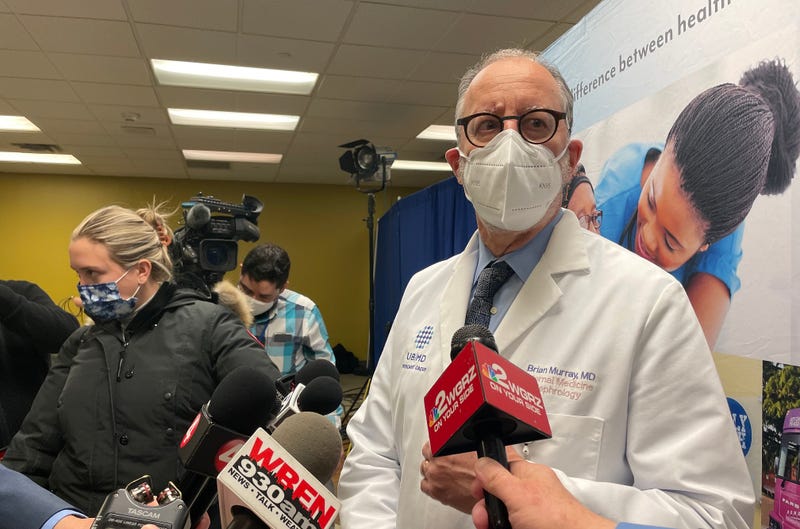
Buffalo, N.Y. (WBEN) - The Omicron variant of COVID-19 is making its way to Western New York, with the first confirmed case of the variant being detected by scientists at the University at Buffalo on Wednesday.
While the efforts continue to combat the Delta variant of COVID-19 currently putting its hold on the Western New York region, another wave of the COVID-19 virus is expected to make its impact across the nation and around the globe.
"We've had many waves," said Chief Medical Officer for Erie County Medical Center, Dr. Brian Murray on Wednesday. "Each variant has brought a wave of its own, starting with the original virus through Alpha, Beta. Most recently, the way we've seen it, we believe and know it was primarily the Delta variant. It surprised us, given the number of people that were vaccinated, that we were seeing the same number of cases in the hospital as we saw last December. That is because the Delta variant was more contagious, and was also - to some extent - more virulent than the previous strains."
Dr. Murray says that ECMC was anticipating and projecting to see as many as 50% more people being sick and potentially ending up hospitalized. But with the re-introduction of the mask mandate by Erie County a month ago, the curve has started to flatten once again, with case numbers and hospitalization numbers now decreased.
According to Erie County Executive Mark Poloncarz during his COVID-19 briefing on Tuesday, ECMC has actually seen a decline in capacity of their ICU beds over the last couple of weeks. However, Poloncarz still said as of Dec. 19, all ICU beds at the hospitals in the Catholic Health System were occupied, as has been the case with Buffalo General Medical Center.
Despite hospitalization numbers and case numbers starting to take a downward trend, not much is still known, as of yet, with the new Omicron variant. With the uncertainties that surround the potency of the COVID-19 variant, some hospitals are left guessing at what will come next for both patients and staff.
"The concern we have now is we have a variant coming that is much more contagious than Delta was. We do expect to see more infections, both in vaccinated and unvaccinated [individuals]. Unfortunately, it's the unvaccinated people who get really sick," Dr. Murray said. "Now there's a question whether this variant may not be as virulent, in other words it may not cause as much severe disease, but it's really too early to be sure about that. Even if it's 20% less people getting sick but it's a larger number, we could end up seeing, again, the kind of numbers we saw last December, and even higher. We just don't know, so we have to prepare for the worst."

Despite the questions surrounding the Omicron variant and the continued fight against the spread of the Delta variant, Gov. Hochul is adamant that now is not a time to panic, especially when comparing where the state of things are now compared to just last year.
"We have the resources we need. We have vaccines, we have boosters, we have masks," Gov. Hochul said. "We have people that are being smart with social distancing, and making sure that if they have any symptoms whatsoever, they're staying home away from work, church, school and their loved ones. It's not March of 2020. It's not even December of 2020. We have to keep this in context."

Another challenge that ECMC is facing, aside from the incoming Omicron variant of COVID-19, is the issues of staffing, and being able to staff the beds in the hospital. ECMC has gotten some recent help from other hospitals in the state, which has been helpful with alleviating the current staff on hand, but Dr. Murray knows that will only go so far when there's still more beds available than nurses to staff the beds.
"We've had people leaving the profession, people retiring early," Dr. Murray explained. "Frankly, our staff have done heroic work, but they've been doing this for over 18 months, and it's been relentless. Particularly this year, there have been very few breaks, and that's really beginning to affect people."
One potential for the lack of new workers coming in to the hospitals as of late is that colleges and other schools are not turning out as many graduates as they have in the past.
"When we hire, we often hire new graduates," Dr. Murray said. "So more people leaving, fewer people entering the profession, and the demand across the board - there's a continuing staffing shortage, and that's a challenge. That's why we don't want to see more people coming into the hospital, because we're already challenged, even with the lower numbers we have now, to provide the best care we can to them. We don't need larger numbers over the next couple of weeks."
Gov. Hochul did acknowledge on Wednesday that with many medical facilities across the state, it is the lack of staffing for the available beds that has led to many capacity issues in hospitals.
Another focal point of Wednesday's press briefing from Gov. Hochul was the amount of free at-home COVID-19 tests that New York State is set to make available to the public come the end of the year.
By Dec. 31, New York State will have five million take-home tests available for the community. Two million of those free take-home tests are being distributed our school districts across the state, while a million tests will go to county emergency managers, 1.6 million tests will go to New York City, and the other 400,000 tests are going to New York State Vaccination Sites.
Gov. Hochul says she expects around 37 million additional take-home tests to be made available for New York State residents when all is said and done.
Dr. Murray believes the at-home rapid COVID-19 tests are a good idea to have, so people can have clarity on their health status before congregating with people this time of year.
"Even those of us who are vaccinated can still acquire this virus. We can transmit it, even if we don't have any symptoms," Dr. Murray said. "I think it's important for people to start incorporating that, particularly if they're going to some kind of venue where they may expose people who are vulnerable, particularly within the family. I have family that came in this week, and we've been tested. My daughter coming in from New York City has been tested, my wife and I have been tested today, and we're all negative. So we can sit back and enjoy the relative security that we're not going to give each other the present we don't want to give at this time of the year."
Dr. Murray also adds it's important to have as many tests available to the public so people can use them in order to go about their everyday lives. It will also give people the sense of what actions they can take whether they were to test negative or positive for COVID-19.




